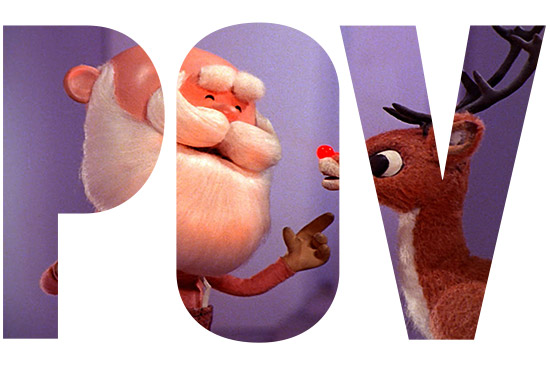POV: Rudolph the Sad, Bullied, Verbally Abused Red-Nosed Reindeer
Sympathetic hero of a beloved holiday or victim from another era whose story should no longer be told—you decide

Image courtesy Videocraft International
I admit, I always get excited around holidays. But not just Flag Day. I like Christmas, too. But this year I’d like to “shine a little light,” if you’ll pardon the pun, on a new controversy about that old classic Christmas tale Rudolph the Red-Nosed Reindeer.
There was a recent poll by Hollywood Reporter/Morning Consult Poll to find out which is the most beloved holiday movie of them all. Coming out on top was 1964’s Rudolph the Red-Nosed Reindeer, which airs each year on CBS. (The poll surveyed 2,200 adults—and 47,000 reindeer.)
But then a video surfaced on the Huffington Post, which has now been viewed almost six million times, that questions the social appropriateness of an animated film featuring bullies and biases and mean-spirited, heartless characters. And an elf who wants to be a dentist. And some believe that there’s no way this red-nosed adventure would get greenlighted in today’s market.
Personally, I’ve seen the Rudolph TV special many times, often sober, so I feel I’m in a pretty good position to give some perspective on this matter. Oh, and I also teach in the College of Communication film and television department, so there’s that, too.
First, I have to say, in all those years of watching this story, I never considered its level of political correctness. I did, however, develop a fear of dentists, and to this day I still leap from the chair screaming whenever my dentist begins singing about being a misfit.
But does the Huff Post have a huff point? The story is about a reindeer who is treated poorly by his family, shunned and ridiculed by his friends, and rejected by Santa Claus (hey, who hasn’t been there?) simply for being different. And then, little Rudolph is only accepted when he’s proved himself to be useful.
Okay, admittedly that might sound like a confusing message. Maybe we’re missing something? So let’s take a closer look at the origins of this story, shall we? To look at Rudolph’s beginnings, one has to go back to the year 1939. (Or two can go back. Or three, it doesn’t matter.)
In 1939 a struggling writer named Robert May was asked by his boss at a popular department store of the time to write a fun Christmas book for shoppers with an animal as the focus of the story. May wasn’t sold on the idea of using an animal as the main character until his boss convinced him it could work by performing a moving two-hour interpretive dance with sock puppets.
Little is known about May and his writing process, but it is well known that he wrote the Rudolph story based on his own life: for as a small child, May, too, was bullied by reindeer.
But the story didn’t come easy. May struggled through many rewrites.
First, there was a story about a warthog named Scratchy, who gets shunned by all those around him because he never brushes his tusks. Next was Cora the Christmas Cobra, then Sammy Salamander Saves the Season, and then Hippo Hank Has a Heart Attack on the Holidays. (It is well documented that May always adored alliteration.)
Then May thought he was really close when he toyed with the idea of a lonely Arctic aardvark who saves Christmas with his “fire-breathing snout,” despite having a broken wing. (It is also well documented that May didn’t know what an aardvark was.) After dozens of exhausting and frustrating stops and starts, it was time for lunch.
It was while May walked around in a Chicago fog, figuratively and literally, that he got the idea for the DeLorean with the flux capacitor. (Wait, that’s another movie.)
But irony was at play when the fog became the shining light for May. That’s what his story would be about! A small reindeer everyone underestimates, who goes on to shine as a beacon of goodness in the fog of meanness.
You see, I don’t believe that May ever saw Rudolph as a victim. Robert May understood exactly how to write a story. He created a sympathetic hero and some nasty nemeses, which made Rudolph’s journey that much more satisfying. And when Santa came to Rudolph on that foggy Christmas Eve asking for his help, Rudolph didn’t block Santa on Twitter and tell him: “Shove it, big guy.” No, Rudolph wasn’t going to play their games. This little future piece of tasty venison took the high road—and flew off into the night, into history, and into the hearts of millions…
Except for those at the Huffington Post.
Rudolph the Red Nosed Reindeer airs Saturday, December 8, on CBS at 8 pm Eastern Time.
William Braudis is a College of Communication assistant professor of film and television. He can be reached at bbraudis@bu.edu.
“POV” is an opinion page that provides timely commentaries from students, faculty, and staff on a variety of issues: on-campus, local, state, national, or international. Anyone interested in submitting a piece, which should be about 700 words long, should contact Rich Barlow at barlowr@bu.edu. BU Today reserves the right to reject or edit submissions. The views expressed are solely those of the author and are not intended to represent the views of Boston University.
Comments & Discussion
Boston University moderates comments to facilitate an informed, substantive, civil conversation. Abusive, profane, self-promotional, misleading, incoherent or off-topic comments will be rejected. Moderators are staffed during regular business hours (EST) and can only accept comments written in English. Statistics or facts must include a citation or a link to the citation.